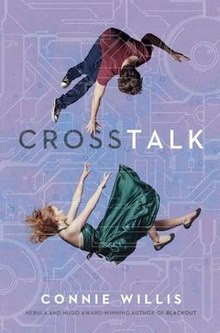Couples, especially couples in new relationships, talk a lot of mushy talk. They love each other in a fresh, exciting way, and often wish they could feel what each other is feeling, know inherently when they are happy or sad, excited or depressed.
In Connie Willis’s Crosstalk, technology has made this possible: a simple outpatient surgery to install a little piece of technology would allow two people to feel what the other person is feeling. You would get just a little impression of what they are feeling. You would know they were grumpy, cheerful, pleased, depressed, or whatever other basic emotions they would be feeling.
Briddey Flannigan chooses to get this device installed at the prompting of her boyfriend, Trent. But things don’t quite go as planned. She doesn’t feel Trent’s feelings at all. She feels something else entirely. Rather, she hears something else. Somehow, she’s acquired the ability to communicate telepathically, and her connection is with her co-worker, CB, rather than Trent.
What follows is a comedy of errors of Briddey trying to work out whether she really loves Trent as much as she thought, of how to explain her odd behaviour to her family, and how to stop hearing CB in her head.
Crosstalk is as much a romantic comedy as it is a science fiction novel about technology gone wrong. Like her previous books about time travel, the plague, and WW2, Connie Willis details as much about the time period and the horrors surrounding them as she does about the banal daily life of the characters. In the case of Crosstalk, there’s nothing as heavy as a world war, but it still seriously considers the implications of new technology in how they can fundamentally alter how we communicate and relate to one another… but also it’s just pretty funny.
I’ll admit that it took me a while to get into the book. I might even say I didn’t like it at first, but the more I thought about it after I finished it, the more I liked it. The concept is just too good, and with the march of technology, timely.
Steven McCreedy is a library technician at the Cambie Branch of the Richmond Public Library



